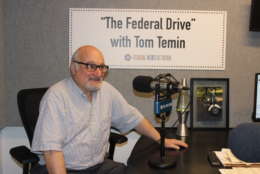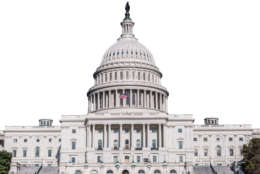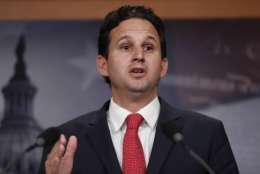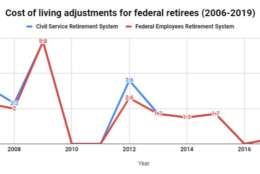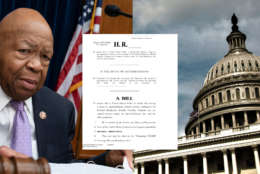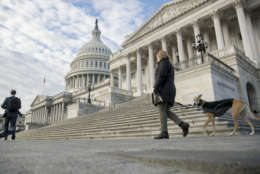Benefits
-
A reader asks a tough question: How long should a terminally-ill fed keep working to get the most from their benefits?
April 24, 2019 -
Social Security and Medicare are both moving toward their insolvency dates. If everyone likes them, why not fix them?
April 23, 2019 -
Is there a state(s) where you can retire and keep more of your own money while enjoying a better standard of living? The short answer: Probably. To get the best tax deal now and in…
April 22, 2019 -
For at least the past six years, right or wrong, smart or not, some nervous feds from Maine to California have kept a nervous watch on Washington and their HR office. They are watching the…
April 19, 2019 -
Bart Stichman, executive director of the National Veterans Legal Services Program, discusses the ongoing health care battle between some veterans and the VA.
April 17, 2019 -
For the last six years many federal workers and retirees have had nightmares about losing major parts of their Civil Service Retirement System and Federal Employees Retirement System benefits. And they’ve gone through a series…
April 17, 2019 -
In today's Federal Newscast, a version of the Federal Employee Paid Leave Act is introduced into the Senate.
April 15, 2019 -
Guest columnist Jeff Neal says it’s hard to argue with the idea that top performers should receive some sort of compensation for their work. It is also hard to argue that most performance review processes are credible and effective.
April 11, 2019 -
Whether it's down to strong job growth or low inflation, financial planner Art Stein says Thrift Savings Plan investors should like first quarter 2019 results.
April 10, 2019 -
In today's Federal Newscast, the Federal Services Impasses Panel sides mostly with management in a disputed between labor groups and the Health and Human Services Department.
April 08, 2019 -
Senior Correspondent Mike Causey thought he had a scoop that the Social Security Administration was offering buyouts to long-time employees but he explains why that's a misunderstanding.
April 05, 2019 -
Federal retirees and folks who get Social Security benefits may be among the few people in the country who get anxious when crude oil prices drop.
April 04, 2019 -
Two new bills that would keep federal employee insurance programs in tact during future government shutdowns has bipartisan, bicameral support.
April 03, 2019 -
In today's Federal Newscast, a bipartisan, bicameral group of lawmakers introduced two new bills to ensure federal employees don't lose insurance benefits during future government shutdowns.
April 03, 2019 -
Benefits expert Tammy Flanagan, will be Mike Causey's guest today on Your Turn, airing 10 a.m. EDT, streaming on www.federalnewsnetwork.com or on 1500 AM in the Washington, D.C., area.
April 03, 2019





